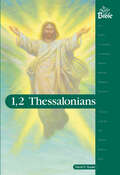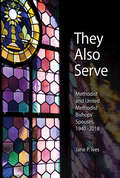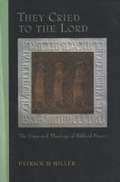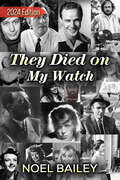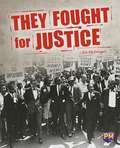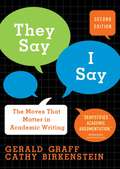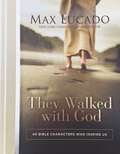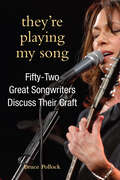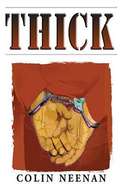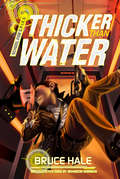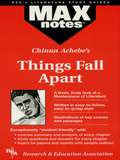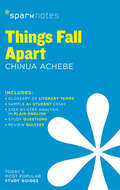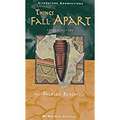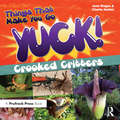- Table View
- List View
Thessalonians (The People's Bible)
by David P KuskeWhat is the book of 1 Thessalonians about in the Bible? What is the book of 2 Thessalonians about in the Bible? Who wrote 1 and 2 Thessalonians?When the apostle Paul left the Thessalonian Christians to share the gospel elsewhere, he feared that these Christians would be overwhelmed by false teachers, persecution, and temptations. He wrote these two letters to encourage them to remain faithful to God’s Word. These letters offer rich hope and remain good reading for Christians faced with challenges to their faith.Want to learn more? If you’re wondering what the books of 1 and 2 Thessalonians are all about, this helpful resource is for you!1, 2 Thessalonians is a reliable Bible commentary. It’s down to earth, clearly written, easy to read and understand, and filled with practical and modern applications to Scripture.It also includes the complete text of the books of 1 and 2 Thessalonians from the NIV Bible. The Christ-centered commentaries following the Scripture sections contain explanations of the text, historical background, illustrations, and archaeological information. 1, 2 Thessalonians is a great resource for personal or group study!This book is a part of The People’s Bible series from Northwestern Publishing House.
They Also Serve: Methodist and United Methodist Bishops Spouses, 1940-2018
by Jane P. IvesStories from the women and men who have served alongside Methodist and United Methodist bishops.When a bishop is elected in The United Methodist Church, it is not only the one elected who is asked to serve but his or her spouse and family as well. Hear the stories of how Methodist and United Methodist episcopal spouses have adjusted to and navigated this life-changing journey. While dealing with the full range of human experience—births, deaths, relationship struggles, and illness—they also travel the world, participate in mission and ceremonies, meet interesting people, and stand up for justice. Through hardships, celebrations, and everyday struggles, these spouses find their own paths of ministry, answering the calls that are also placed upon their lives. In these ways and many others, they also serve.Praise for They Also ServedA meticulous labor of love by Jane P. Ives, They Also Served remembers faithful unsung Christians by chronicling previously unrecorded details of the spouses of episcopal leaders. Sometimes in the spotlight, often in the shadows, the bishop's spouses struggled to fulfill unpaid roles and undefined responsibilities in the church, usually far from family and friends. Ives empatheticlly highlights how these persons, usually without voice or vote, helped shape the church's mission and ministry.- Dr. Donald E. Messer, Executive Director, Central for Health and Hope: Focusing on Global HIV and AIDS, Centennial Colorado.Bishops may ebb and flow in their popularity based on their decisions, but their spouses are almost universally loved and admired. Jane Ives helps readers understand why that is the case with her comprehensive story of the impressive, diverse, and thoroughly dedicated women and men who have contributed so much to God's work.—Lovett H. Weems, Jr., Distinguished Professor of Church Leadership Emeritus, Wesley Theological Seminary, Washington, DCIn the gospel of Luke, Jesus sent the disciples out, two by two, to every town, and country, every charge and conference. Ives' book records the wisdom of sending two, and restores the names of those often forgotten in the story of the people called "Methodists," the spouses. These are remarkable oral histories as well as timelines of social holiness and global service. This is not a book about survival in ministry and marriage; it's a testimony to those who thrived in their calling. —Heather Murray Elkins, Professor of Worship, Preaching, and the Arts, The Theological School of Drew University, Madison, New JerseyThis is a book about discipleship. It is also a book about ministry and itinerancy.It tells stories of how God sometimes calls two people to the work of episcopacy, people who happen to be married to each other. It is a book that will make you laugh and cry!This book is an important addition to the literature of Methodist episcopacy. And it is a hard book to put down!—William Boyd Grove, Bishop (Ret.) of The United Methodist ChurchJane Ives has given the Methodist family a priceless treasure. Through an astonishing effort to collect memories and explore archival material, she has compiled a comprehensive record of episcopal spouses, their stories, accomplishments, and contributions to the church. But this book is more than a biographical dictionary. It offers a poignant, insightful account of the lives of bishops, their spouses and families, and the impact of the church's expectations on all of them. As a little boy, I knew firsthand the phone call: get on a train to New Orleans with your sister; your Daddy is going to be a bishop. Allow me to testify, then, that this book is the real deal -- genuine, human, and rich with faith and Spirit.—Thomas E. Frank, Associate Dean for Continuing Studies, Graduate School of Arts and Science, Wake Forest University, Winston-Salem, North CarolinaLaity and clergy active in United Methodist life and their spouses will want to immerse themselves in this "corporate" autobiography, which provides an overview of Methodism through almost 80 years of personal experiences and cultural change. Jane Ives, a
They Came for the Schools: One Town's Fight Over Race and Identity, and the New War for America's Classrooms
by Mike HixenbaughNATIONAL BESTSELLERThe urgent, revelatory story of how a school board win for the conservative right in one Texas suburb inspired a Christian nationalist campaign now threatening to undermine public education in America—from an NBC investigative reporter and co-creator of the Peabody Award–winning and Pulitzer Prize finalist Southlake podcast. Award-winning journalist Mike Hixenbaugh delivers the immersive and eye-opening story of Southlake, Texas, a district that seemed to offer everything parents would want for their children—small classes, dedicated teachers, financial resources, a track record of academic success, and school spirit in abundance. All this, until a series of racist incidents became public, a plan to promote inclusiveness was proposed in response—and a coordinated, well-funded conservative backlash erupted, lighting the fire of a national movement on the verge of changing the face of public schools across the country.They Came for the Schools pulls back the curtain on the powerful forces driving this crusade to ban books, rewrite curricula, limit rights for minority and LGBTQ students—and, most importantly, to win what Hixenbaugh’s deeply informed reporting convinces is the holy grail among those seeking to impose biblical values on American society: school privatization, one school board and one legal battle at a time.They Came for the Schools delivers an essential take on Donald Trump and Ron DeSantis, as they demean public schools and teachers and boost the Christian right’s vision. Hixenbaugh brings to light fascinating connections between this political and cultural moment and past fundamentalist campaigns to censor classroom lessons. Finally, They Came for the Schools traces the rise of a new resistance movement led by a diverse coalition of student activists, fed-up educators, and parents who are beginning to win select battles of their own: a blueprint, they hope, for gaining inclusive and civil schools for all.
They Cried to the Lord: The Form and Theology of Biblical Prayer
by Patrick D. MillerThe book introduces biblical prayer in all its varied forms and from different angles: the prayers of Israel's neighbors, the names of God in prayer, prayers for help, the response of God, praise, the prayers of women, confession and penitence, prayers for others, blessing and curse, and Jesus and Paul at prayer.
They Died on My Watch: 2024 Edition
by Noel BaileyWho was the actress who died just before Christmas? She was the voice of …..... in …......Did Hitler commit suicide, or was he shot by Russian troops?Do you remember what year Princess Diana died in that car crash in Paris?How many husbands did Elizabeth Taylor divorce in her lifetime?What was that well known British actor who passed away right after David Bowie died?Questions you might hear at the next table of your favourite eatery. Questions you may or may not know the answer to. They Died on My Watch can answer these and many more. It is a comprehensive reference work that should prove itself indispensable to any household. Most certainly a book to sustain interest when cruising at 35,000 feet between London and New York. It might be seen as the ultimate &‘umpire&’ to settle any argument that may arise within a discussion involving a deceased celebrity, recent or not.
They Don’t Behave for Me: 50 classroom behaviour scenarios to support teachers
by Samuel StricklandThey Don't Behave for Me supports teachers with some key behavioural scenarios - ranging from classroom disruption and rudeness, to bullying, fights, and even a lack of overall behavioural strategy at a school level. Sam Strickland draws on his own experience to illustrate 50 common situations that he has had to resolve, seek support with, or offer advice on, and which most teachers will face at some point as they progress through their career into middle and senior leadership. Each scenario is broken down into an outline of the issue, a what to do in the immediate now, and a follow-up set of next steps.We should never condone poor behaviour - but how do we keep going and find the answers to resolve things when they go wrong? This book will guide you from some of the key challenges regularly faced by teachers towards your own approach to effective behavioural management.
They Don’t Behave for Me: 50 classroom behaviour scenarios to support teachers
by Samuel StricklandThey Don't Behave for Me supports teachers with some key behavioural scenarios - ranging from classroom disruption and rudeness, to bullying, fights, and even a lack of overall behavioural strategy at a school level. Sam Strickland draws on his own experience to illustrate 50 common situations that he has had to resolve, seek support with, or offer advice on, and which most teachers will face at some point as they progress through their career into middle and senior leadership. Each scenario is broken down into an outline of the issue, a what to do in the immediate now, and a follow-up set of next steps.We should never condone poor behaviour - but how do we keep going and find the answers to resolve things when they go wrong? This book will guide you from some of the key challenges regularly faced by teachers towards your own approach to effective behavioural management.
They Fought for Justice (Into Reading, Level S #61)
by Jill McDougallNIMAC-sourced textbook <p><p> Throughout history, many individuals have fought for justice and equality. The six people in this book are remarkable examples of people who fought for what is right. Through their courage, leadership, and self-sacrifice, they improved the lives of millions of people. Today, their stories continue to inspire others to work toward a fairer world.
They Moved My Bowl: Dog Cartoons by New Yorker Cartoonist Charles Barsotti
by Charles Barsotti George BoothThis is the first, and long-overdue, book of Charles Barsotti's dog cartoons. Barsotti's distinctive round pups, rendered in just a few simple lines, have been delighting The New Yorker readers for three decades and are instantly recognizable for their depiction of canines in human roles. The juxtaposition of their simple world, consisting only of food, play, and the goings-on of their owners, with the utterly human tasks of going to therapy, talking business, or seeing a lawyer, is both adorable and hilarious. A dog standing at a podium announces, "If elected, I promise to beg, fetch, and roll over." An older dog frowns down at a young pup and says, "Don't be smug, all puppies are cute." An angry dog with brush in hand paints a "BEWARE OF DOG" sign. With an irresistible blend of biting humor and affectionate observation, this is a perfect gift book for dog lovers everywhere.
They Say / I Say: The Moves That Matter in Academic Writing (2nd edition)
by Gerald Graff Cathy BirkensteinThey Say / I Say has essentially defined academic writing, identifying its key rhetorical moves, the most important of which is to summarize what others have said to set up one's own argument.
They Snooze, You Lose
by Lynell BurmarkPresentation skills that that will captivate your audience every time In today's increasingly visual world, the art of giving presentations is a much-needed talent. They Snooze, You Lose, provides a comprehensive guide made especially for teachers and administrators who want to become presentation "stars" in their classrooms, at board meetings, or any time they are in front of an audience Describes how to apply the author's proven CHIMES2 elements: Connections, Humor, Images, Music, Emotion, Stories, and Senses Contains a bonus DVD with premade slides, a study guide, and reproducible images Burmark is the author of the best-selling book Visual Literacy: Learn to See, See to Learn Includes key sections on the best ways to integrate technology into your presentations New and seasoned educators alike will benefit from this fun and easy-to-read guide on building essential presentation skills.
They Walked with God: 40 Bible Characters Who Inspire Us
by Max LucadoThe characters we meet in the Bible play a huge role in our lives. Whether we personally relate to Joseph&’s dedication to serving the Lord even when he was confused or we understand when Mary Magdalene mourns in front of the vacant tomb, the timeless stories we find in the Bible influence and inspire us to learn to be more like Christ. But how can we apply these lessons to our everyday lives?In They Walked with God, a compilation adapted from previous works with new content added, pastor and New York Times bestselling author Max Lucado takes a closer look at 40 of the most inspirational characters in the Bible and shares a powerful message: if God can find a place for each character in the Bible, we can rest assured that he&’s carved out a spot for us too.They Walked with God includes a series of meaningful, in-depth discussion questions that correspond with each biblical character that Max has highlighted, giving you a chance to reflect further about the incredible lives they led and the lessons we can learn from them. This one-of-a-kind, interactive resource is ideal for devout followers and new believers alike.In this compilation, Max weaves together stories from Scripture with stories that offer a modern perspective, bringing each of these men and women to life within the pages of They Walked with God. Max will encourage you as you get to know these figures, and yourself, better by:Guiding you through a comprehensive study of 40 of the Bible&’s most remarkable--and sometimes seemingly unremarkable--charactersProviding 185+ thoughtful and engaging discussion questions designed to spark further conversation about how we can apply these lessons to our daily livesSharing personal stories that will help you grow your faith and strengthen your relationship with JesusMax adds dimension and depth to 40 incredible people who had the chance to walk alongside God, reminding us that we&’re invited to walk alongside him too.
They're Playing My Song: Fifty-Two Great Songwriters Discuss Their Craft (Excelsior Editions)
by Bruce PollockThe greatest songwriters of the rock era tell how they created their biggest hits.They're Playing My Song collects for the first time over fifty in-depth, personal interviews with the greatest songwriters of the rock era. Author Bruce Pollock has been writing about rock and pop music for over six decades and has enjoyed unique access to leading songwriters, some well-known, others only known through their work. His interviews span all genres, from doo-wop to hip-hop, and all of pop music's greatest eras from the fifties to today. Unlike other books that focus on personalities, Pollock focuses on the songwriter's craft, encouraging his subjects to reflect on how they’ve created the hit songs that defined their eras. A sensitive interviewer with a deep knowledge of the songwriter's work, Pollock is able to draw unique insights from a range of songsmiths, from John Lee Hooker reflecting on how he created some of his iconic blues songs, to Paul Simon's deeply analytical approach to crafting his hits, to contemporary songwriters like Julie Gold who speak to the ever-changing world of the pop music industry. Many of the interviews have been expanded and updated from their original publication. Anyone interested in how songwriters approach their craft will be enthralled by this book told in the unique voices of the creators themselves.
They're Watching You
by Chelsea IchasoA dark boarding school thriller from the author of Dead Girls Can't Tell Secrets and The Summer She Went Missing!When a secret society has you in their sights, it can lead to power, privilege… or death.It's been two weeks since Polly St. James went missing. The police, the headmistress of Torrey-Wells Academy, and even her parents have ruled her a runaway. But not Maren, her best friend and roommate. She knows Polly had a secret that she was about to share with Maren before she disappeared— something to do with the elite, ultra-rich crowd at Torrey-Wells.Then Maren finds an envelope hidden among Polly's things: an invitation to the Gamemaster's Society. Do not tell anyone, it says. Maren is certain her classmates in the Society know the truth about what happened to Polly, though it's no easy feat to join. Once Maren's made it through the treacherous initiation, she discovers a world she never knew existed within her school, where Society members compete in high-stakes games for unheard-of rewards—Ivy League connections, privileges, favors.But Maren's been drawn into a different game: for every win, she'll receive a clue about Polly. And as Maren keeps winning, she begins to see just how powerful the Society's game is—bigger and deadlier than she ever imagined. They see, they know, they control. And they kill.
Thick
by Colin NeenanNick has never felt in control. He's slow in school, he has an alcoholic father, and he likes a pretty waitress whose cruel boyfriend taunts Nick, making him feel more powerless than usual. Nick wants to help his sister get away to go to college (against their father's will), and he wants to protect the waitress from her abusive boyfriend. And suddenly he feels in control--with a gun in his hand--until he discovers he's far, far from the truth. A brief, compelling story with the impact of H. E. Hinton's The Outsiders, gritty action combined with Nick's kindness and humanity make this a novel of gripping suspense and surprising redemption for the reluctant reader.
Thicker Than Water
by Carla JablonskiSeventeen-year-old Kia barely survived her parents' divorce several years ago. Now her mom is in the hospital battling cancer and Kia is stuck with her workaholic father, leaving her searching for an escape from the everyday horrors of her life.<P><P>She finds this escape with a group of people acting out a dark fantasy. These "vampires" spend all night in dark clubs, wearing gothic outfits, and even baring fake fangs. But when Kia meets Damon, she begins to wonder if maybe a true vampire exists among them, one who could be the answer to all of her problems . . .
Thicker Than Water (A School for Spies Novel #2)
by Bruce HaleJust when Max Segredo learned that his father is still alive, he also learned that Simon Segredo was working for LOTUS, an evil spy operation that wants to take down the Merry Sunshine Orphanage (a.k.a. the School for S.P.I.E.S.) and take over the world. Now Simon is on the run from LOTUS, and Max's surrogate family at the orphanage is being threatened from without and within. LOTUS is trying to drive the school out of business, while the Ministry of Health is investigating an anonymous complaint about the orphanage. To top it all off, the trainee spies are riddled by fear and squabbling among themselves. Into this chaos strolls a mysterious billionaire who hires S.P.I.E.S. to steal a powerful mind control device. The fee for the job will help save the school, but there's a catch: they've got just three days to pilfer the device from an ultra-secure facility before LOTUS steals it first. Can the S.P.I.E.S beat their rivals to the prize before the orphanage doors close for good? In this action-packed sequel to Playing with Fire, it is impossible not to root for Max, a spy-in-training with mad skills, a spunky attitude, a way with the ladies (well, okay, maybe not so much), and a big heart.
Thief of Hearts (A Body of Evidence #2)
by Christopher Golden"Why would anyone want to tear out someone's heart?" That's the very real question facing college freshman Jenna Blake, and it has nothing to do with romance and heartbreak. A second grisly murder mystery is unfolding at Somerset University, and her job as a pathology assistant at the local hospital brings Jenna too close to the haunting crimes. Everyone has a theory on the nature of the killings, including Jenna's older half-brother, Pierce Logan, who's new in town and has some odd ideas about why someone would want to steal a human heart. Meanwhile, Jenna begins working on her own heart when she meets a fascinating older man. But there's little time for dating when the "Thief of Hearts" declares Somerset the perfect hunting ground -- and someone very close to Jenna is the prey.
Thin Ice: Independent Reading 11 (Reading Champion #300)
by Sue GravesWhen friends Lenny and Ted take their bikes off to the woods on a cold, snowy day, Mum warns them to keep away from the icy pond. The trouble is, Lenny just can't resist it and ends up nearly paying a very high price...Reading Champion offers independent reading books for children to practise and reinforce their developing reading skills.Fantastic, original stories are accompanied by engaging artwork and a reading activity. Each book has been carefully graded so that it can be matched to a child's reading ability, encouraging reading for pleasure.The Key Stage 2 Reading Champion Books are suggested for use as follows:Independent Reading 11: start of Year 3 or age 7+Independent Reading 12: end of Year 3 or age 7+Independent Reading 13: start of Year 4 or age 8+Independent Reading 14: end of Year 4 or age 8+Independent Reading 15: start of Year 5 or age 9+Independent Reading 16: end of Year 5 or age 9+Independent Reading 17: start of Year 6 or age 10+Independent Reading 18: end of Year 6 or age 10+
Things Fall Apart (MAXNotes Literature Guides)
by Sara O'BrienREA's MAXnotes for Chinua Achebe's Things Fall Apart MAXnotes offer a fresh look at masterpieces of literature, presented in a lively and interesting fashion. Written by literary experts who currently teach the subject, MAXnotes will enhance your understanding and enjoyment of the work. MAXnotes are designed to stimulate independent thought about the literary work by raising various issues and thought-provoking ideas and questions. MAXnotes cover the essentials of what one should know about each work, including an overall summary, character lists, an explanation and discussion of the plot, the work's historical context, illustrations to convey the mood of the work, and a biography of the author. Each chapter is individually summarized and analyzed, and has study questions and answers.
Things Fall Apart SparkNotes Literature Guide (SparkNotes Literature Guide Series #61)
by SparkNotesThings Fall Apart SparkNotes Literature Guide by Chinua Achebe Making the reading experience fun! When a paper is due, and dreaded exams loom, here's the lit-crit help students need to succeed! SparkNotes Literature Guides make studying smarter, better, and faster. They provide chapter-by-chapter analysis; explanations of key themes, motifs, and symbols; a review quiz; and essay topics. Lively and accessible, SparkNotes is perfect for late-night studying and paper writing. Includes:An A+ Essay—an actual literary essay written about the Spark-ed book—to show students how a paper should be written.16 pages devoted to writing a literary essay including: a glossary of literary termsStep-by-step tutoring on how to write a literary essayA feature on how not to plagiarize
Things Fall Apart and Related Readings
by Chinua AchebeA book containing Things Fall Apart by Chinua Achebe and other great poems, stories and essays.
Things I Like
by Mary Catherine JohnsonFrom bubbles in the bath, to teddy bears in bed—it's all the things I like!
Things My Child Likes to Do Administration Manual
by Joseph Renzulli Jennifer Foreman Laurel BrandonThings My Child Likes to Do enables educational decision-makers to collect information on children's social, emotional, motivational, and creative abilities from the perspective of those who know them best: their parents or guardians. These scales can be used as one component of a multiple measures identification system for gifted, talented, or enrichment programming or to collect information on students' readiness, interests, and learning profiles. The scales have been subjected to content and construct validation to provide clear, accurate, and informative data regarding student characteristics. The Administration Manual provides information on the new rating scale's validity and advice on administering the scale.
Things That Make You Go Yuck!: Crooked Critters
by Jennifer Dlugos Charlie HattonNature doesn't always play nice, and Things That Make You Go Yuck!: Crooked Critters showcases some of the worst offenders in the plant and animal kingdoms. You'll meet trespassing toads, insects in disguise, brood-borrowing cuckoos, and many more. It's a rogue's gallery of some of nature's roughest, meanest species. Whether it's nature's slimiest organisms or the weirdest mutations, Things That Make You Go Yuck! celebrates survival of the fittest, grossest, craziest, and creepiest things in nature, proving once and for all that life in the wild is anything but ordinary.Ages 9-12
